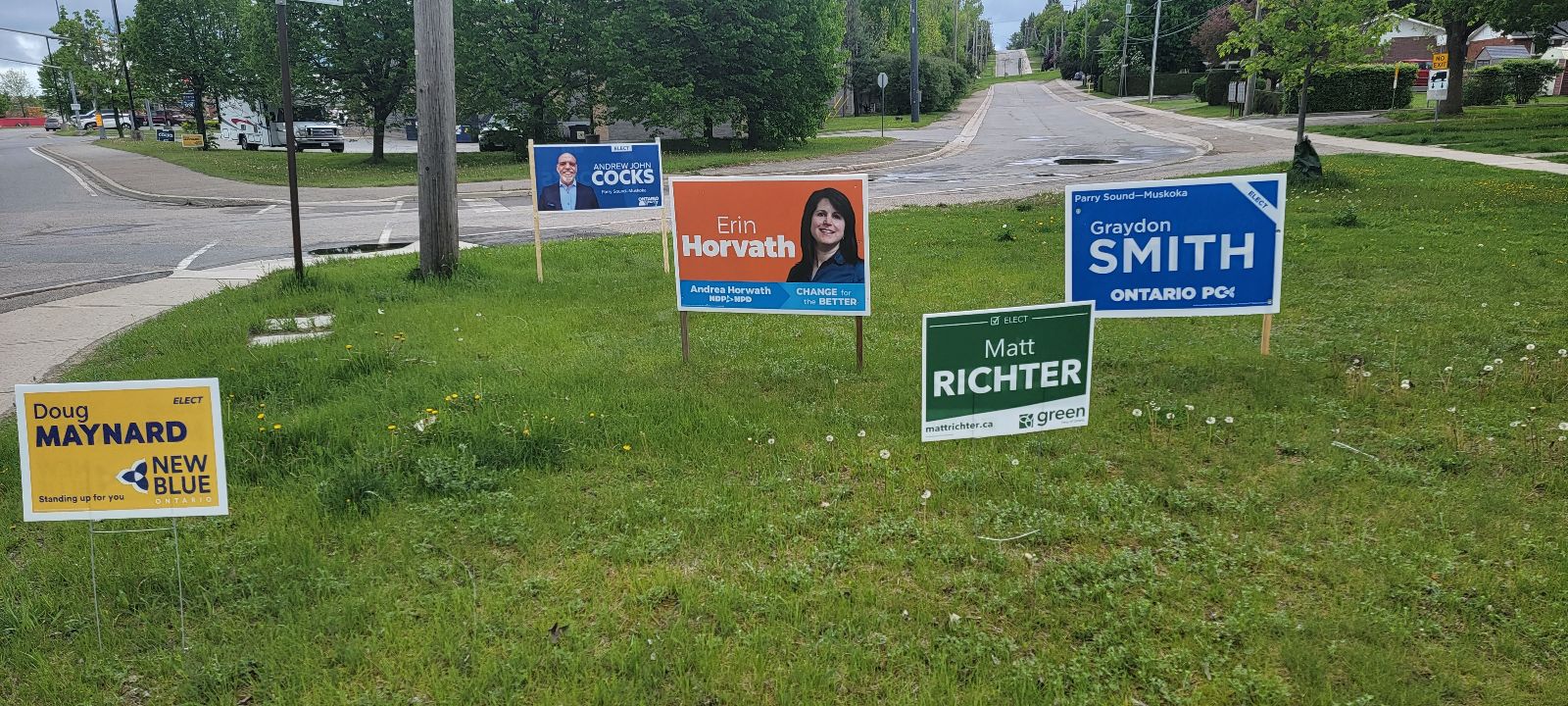The MyMuskokaNow.com newsroom reached out to all the candidates that will be on our riding’s ballot for the June 2 provincial election to get their thoughts on the issues that matter in Parry Sound-Muskoka.
Each week leading up to election day, we will publish a story with each candidate answering a question that residents have as they head to the polls.
This week we asked them about the environment: with the riding’s growing population, the area is also seeing a lot of development. With concerns about natural features being cleared to make room for expansion, what is your party’s plan to maintain the natural environment that many see as a selling point for Parry Sound-Muskoka?
Graydon Smith, Progressive Conservative Party of Ontario
Smith says the PCs are committed to protecting the natural environment, not just in Parry Sound-Muskoka, but throughout Ontario. “We all love it here,” he says. “We interact with it every day.”
He explains that municipalities have official plans in place that direct where and how growth happens. Smith adds that rules and regulations are in effect to ensure our area stays “pristine.” He says he wants those plans to be strong, along with the local environment.
If elected, Smith pledges to work with local leaders to ensure that doesn’t change. He says working with municipalities and continuing the positive relationship the government has with them is why he wanted to run.
Audio Player
Erin Horvath, Ontario’s New Democratic Party
Horvath says the pandemic saw an influx of wealthier folks moving to Cottage Country that are often looking to purchase or build new houses. Horvath says, as a result, there’s an increase in pressure to build a certain type of home, often on the water or in secluded areas which in turn puts a considerable amount of pressure on the natural environment.
She says we need to ensure that plans for watersheds, waterways, protected areas, Indigenous sensitive sites, and other sensitive sites are completed and that economic growth falls within those plans. Horvath says if elected, her party would end the use of ministerial zoning orders and respect the municipal planning processes to ensure development is aimed at densifying within already established development areas while requiring newly built public residential commercial buildings be net-zero by 2030.
She says the NDP will repeal schedule 6 of Bill 229 to reverse the destructive changes to the Conservation Authorities Act and the Planning Act and confirm the role of conservation authorities in integrated watershed management. Horvath says the NDP would also create a water strategy for Ontario ensuring everyone including First Nations have clean drinking water and that all aspects of water delivery remain in public hands.
Audio Player
Matt Richter, Green Party of Ontario
Richter says locals and tourists both know the lakes, rivers, and forests are the “crown jewel” of the riding, adding they’re a key driver for the economy as well.
Over the years, he says he’s heard from people, notably in Bracebridge, Huntsville, and Gravenhurst, who are frustrated that developers are coming in and clear-cutting forest for housing projects that don’t meet the needs of people in the community.
Richter says municipalities need a more consistent provincial policy to ensure that new housing projects meet the needs of the growing population. “We will bring in common sense planning policies that encourage sustainable growth while protecting the people and places we love,” Richter says.
Audio Player
Doug Maynard, New Blue Party of Ontario
Maynard says that while development is needed, balancing it with protecting the natural environment is a must.
He believes that starts with consulting developers and figuring out what their goals are. “Are they trying to urbanize the whole area,” he wonders aloud. “That’s not something we want to promote.”
Maynard says his party wants development, but the “wonderful land” we live on has to be taken into consideration.
Audio Player
Brad Waddell, Populist Party of Ontario
Waddell says a “common sense approach” needs to be taken with how and where we build.
He says open spaces and natural features also need to be preserved, and that protecting the riding’s waterways– keeping them clean and natural– is his biggest priority.
According to Waddell, his party’s approach would be to remove some of the red tape around building, but not “open up too hard,” adding that he doesn’t think anyone wants to see high rises go up everywhere.
He also says more existing buildings should be repurposed into provincially-controlled low-income housing.
Audio Player
Andrew John Cocks, Ontario Party
According to Cocks, his party would pass legislation to limit urban sprawl, as well as ban the dumping of untreated waste into waterways.
Cocks says they would also support right-to-repair laws, to keep appliances and equipment out of landfills, and increase funding for municipal sewage treatment.
He adds the party would direct conservation away from private organizations and into public crown lands, and support initiatives to clean garbage out of forests and water bodies.
Audio Player
Daniel Predie Jr., Independent
Predie Jr. says he would abolish the legal system in Ontario, and establish local committees of “concerned men and women” in its stead. He says this is to introduce a retroactive “Smart Growth type plan,” which would restrict the size of a house. He adds he can’t believe the size of homes built in communities such as Nobel, Ontario, with some having five-car garages.
With issues affecting water and the environment all around the world, Predie Jr. says re-introducing a Smart Growth plan under the leadership of local committees would end exploitation in the development sector in Parry Sound-Muskoka.
Audio Player
**With files from Mathew Reisler, Martin Halek, and Mohamed Fahim.







